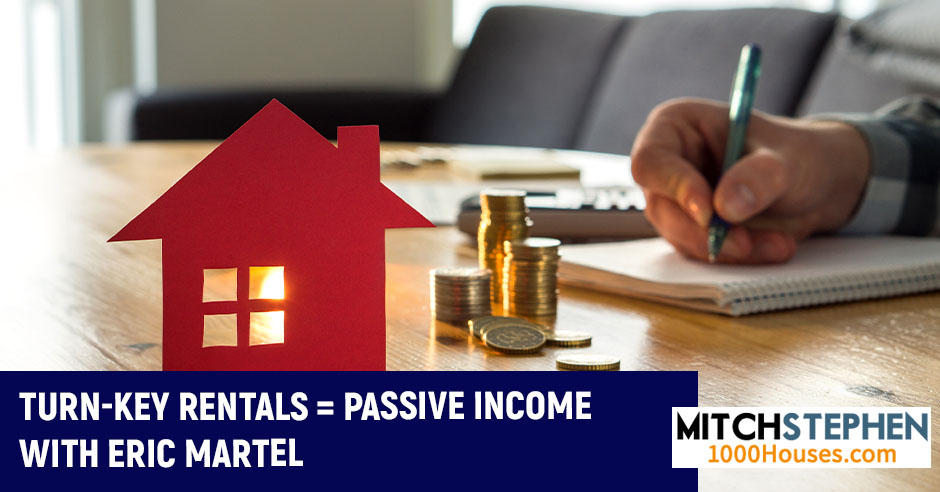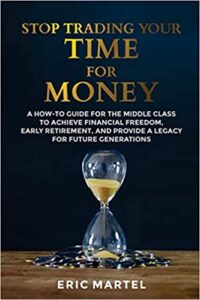PODCAST
Turn-Key Rentals = Passive Income With Eric Martel
Episode 502: Turn-Key Rentals = Passive Income With Eric Martel

You want to start thinking of your passive income strategy early in your career. One of the best ways to get a passive income is through real estate and turnkey rentals are just one of the best property classes to go about it. Here to tell you why are your host, Mitch Stephen and his guest, Eric Martel. Eric is a real estate investor and the founder of MartelTurnkey. He is also the author of Stop Trading Your Time For Money. Join in the conversation on why Eric believes that turnkey rentals equal passive income. Join in and learn how to carve your own path to real estate success today.
—
Watch the episode here
I’m here with Eric Martel. Eric, where are you sitting at now physically? What town, city, state, country?
Hermosa Beach, California. It’s a small little beach town close to Los Angeles.
We’re going to be talking about turnkey rentals and why you might be interested in getting into the turnkey rental business. Also, taking advantage of turnkey rentals to create passive income so you don’t have to work for the rest of your life and you can fire your boss. Before we get started, I’d like to say thank you to LiveComm.com for sponsoring this episode. There’s a reason why I have no signs in my yards when I sell a house. Not even one. I hardly spend any advertising money at all. I sell my house within four days. I average four days on the market in my last 200 houses.
There’s a reason why. Check out LiveComm.com. It’s all about lead generation, capturing cell phone numbers, text messaging people that are interested in what you have to offer at will, and connecting dead on for minuscule amounts of money and super-fast. Thank you very much for the sponsorship, people. Eric, give us a little background on you so we can figure out where you come from. You started out as a young man. Why real estate?
I started my first dip into real estate when I was eighteen years old. I booked my first apartment building. I was still at university and I had met this real estate mentor or real estate investor. The thing is that he was just a normal person. He was a regular community college teacher. You would have met him and you wouldn’t have thought twice about it. He had built a 36-unit apartment building. He was planning to do a shopping center. He was working with architects and all of that. He was also investing in nursing homes. I knew that I wanted to get as much information from this guy and say, “How can you do it?” I came from a modest background. My parents have 9 to 5 like normal people. We’re not poor and we’re certainly not rich.
I knew that this is not what I aspire to do. It’s more than that. I knew that I was very interested in business and all of that. When I met this guy, I knew that I had to learn from him. He agreed to be my mentor and after nine months and stuff like that, I finally found an apartment building that I was able to buy. No money down and still cashflowing. That was my first real estate investment. This was when I knew that it was possible. It was not part of my grand plan to achieve financial freedom at that point. I was so young. I had all the time in front of me, but it was a test and experience to say, “I can make money without working 9 to 5. I have money coming into my bank and by collecting rent and all of that. That was the first test for me.
Unrecognized gains are not gains. Share on XAfter that, I moved into different big towns in Montreal, Chicago and San Francisco Bay Area since 2000. Every time, I tried to find the same real estate investment that was cashflowing but also had good returns, and it was not possible. In San Francisco, you could find something that cashflow, but you had to put 75% of the property down and your return on cash was ridiculously low. Slightly below treasury bills or bonds. I decided to stay in the stock market and not do anything else after that. I knew that I needed to do something. I was still focused on passive income. We had the dot-com crash and I knew that’s going to put more fire under me. I lost a lot of money in that dot-com crash. I had stock options, then I said, “I want to be in control. The stock market is great.”
Did any of your stocks go to zero?
None of them went to zero but they dropped. Some of them dropped to 7% to 8%. The stock options, as you know, goes so close to the strike price then they became almost worthless. That’s where it hit me with all of this paper money that we didn’t convert into cash yet. When you have that going, this is worth this much money. As soon as the stock market drops, you see where the value goes. It goes out the door.
I talk to my private lenders and they say, “I’m kicking ass in the stock market,” I said, “So you sold?” “No, I haven’t sold yet.” I said, “You haven’t made anything if you haven’t sold.” “But it’s up like seven.” I said, “The trick is you have to sell before it goes down,” and that’s where everyone fails.
Unrecognized gains are not gains.
It’s like in Vegas. At one point, you might be up at blackjack three times what you brought in the door, but if you don’t go home and go to bed with it, it’s going to disappear. You said a lot of stuff there. I was making some notes. How long it took you to find your first place? I think people need to understand that it takes a long time to come to a lot of conclusions for yourself. People can tell you all they want to on seminars, Zoom, podcast episodes or webinars, but until you come to a conclusion in your own heart, “I need to do something like X or Y,” it doesn’t ever become real. I bought my first place when I was 20 or 21. I didn’t get a handle on what I was trying to do until I was 34. It was a long process and youth is not in your favor. You’re too dumb to know anything.

Turnkey Rentals: Becoming an entrepreneur is very different from a 9 to 5 business person. You are in control. You can’t just sit in the back and wait for things to happen. You have to make things happen.
Youth has some advantages but also has significant disadvantages. I had no money. I had like $200 in my bank account. When I had to sign with the credit union to get the loan, the application fee was $150. It was like, “Three-quarters of my bank account is gone. This better work.” They’ve worked out but it was a great test for me to give me the confidence to look forward and focus on business.
You wrote an eBook and it’s downloadable. It’s Stop Trading Your Time for Money, which is a big mistake that people make. A lot of entrepreneurs get stuck in that trading time for money. They invent a business that they make a nice logo. They get their own phone number and don’t work for anybody else, but they essentially created up a job while they’re a slave to their clients or to the business that they been in the door because they never learned to get out of the way of the business.
There are some businesses that would be easier to get out of the way than others. You’re fond of buy and hold or rental properties. I’m fond of rental properties of a different type but it’s still rental. It only takes property managers after that point to handle it. That’s not rocket science. It has its minutia and it’s a little bit of sophistication, but it’s not rocket science. You can get your freedom.
It takes a little while for people to get to that conclusion. We’re all chasing the money. We want the money, but then after you get the money, you find out like, “This isn’t as cool as I thought because I have a lot of money, but I’m tired and I have no time. I have a lot of responsibility and this is heavy.” What is it? There’s always another level. Learn how to get out of the way, so the money can make money, then learn how to enjoy the money, and not have the money ruin you. Also, how do you cut your tax liability legally and all that stuff. There’s always another level. Tell us about your book, Stop Trading Your Time for Money.
I wrote a different book before writing the eBook. I had a completely different plan as I was going through it. Everybody should write a book. Whether you publish it or not is a different story. Writing a book makes you think and organize your thoughts, where you are now and how your work became successful if you consider yourself successful. I had been an independent consultant for many years. You can’t imagine how your money is tied to the hours you’re selling. One hour of your work, it’s one hour at your rate that you’re getting in the bank. You stop working. You want to go on vacation. Not only do you have to pay for your vacation, but you also have to not make any money.
It’s like the surgeons. I feel sorry for surgeons. I have doctors that are my private lenders. When they look at my life and look at their life, they go, “What the hell did I do? This guy, Mitch Stephen, barely has a high school diploma. He’s on vacation all the time.”
Recognize how much your money is tied to the hours you're selling. Share on XI knew that. I could feel it. Every time I was going on vacation, I would be stressed out. More stressed than I’ve been at work. At work, at least I knew that I was making money. You never know when the plug is going to be pulled on a project or something. I was a business consultant so I work on a big project, and then the companies decide, “This is canceled. You shifted the budget around and this is not a priority anymore. Goodbye.” What do I do it now? There’s a big gap in my budget all of a sudden. It could take me 3 to 6 months to find another project like that. You have to have savings and all of that if you don’t have passive income. This is why I’m telling people that you need to focus on financial freedom and building a passive income stream as early as you possibly can.
What’s the biggest challenge for people? They come to the conclusion, “I need to build financial freedom,” but what do you think is the biggest challenge?
The biggest challenge is they need to figure out that this is something that they need to do. They have to go through that process. There’s also a mind shift because if you’re used to working a 9 to 5, you are told what to do and all of that, then you do it, and you’re done for the day. When you are working on your passive income, this is you becoming an entrepreneur. You’re becoming a business person and this is very different. You are in control or you are the one driving the agenda and driving your business. You can’t just be sitting back and waiting for things to happen. You have to make things happen. This is a very big mind-shift that people don’t realize that they have to do.
There’s a book that I read a while back called What Got You Here Won’t Get You There. It was about that shift. You were very successful in your job and all of that. The next step is, there are some skills that are transferable that you can use, but there’s a bunch of other skills that you need to acquire and realize that you need more to move forward. That’s probably the number one thing why it’s a big challenge. You set up your goal and then find the strategies. There are so many strategies out there and people don’t know what to pick. They go to these meetups and say, “This one is making a lot of money. They made $5,000 or $10,000. I want to make $10,000 or $100,000.” You see all these different strategies. It gets them off track. You have to pick a strategy that matches your resources and capabilities.
The big one is about money and the second big one is about time. How much time do you have to devote to this strategy? We can do full development projects and stuff like that from the ground-up development and all of that, but it takes time for you to work with all the different groups for the permit, for the architect, for the contractors, and all of that to get all of that sorted out. It takes a long time for it to be done. You could do that but do you have the time? If you’re working full-time, you don’t have the time to work on that. Out of all the strategies, we need to find the one that fits your resources in terms of money and time.
This is why in my book, I have an investment quadrant. They’re passive income strategies and where they fit in this quadrant. You want to be in the lower-left quadrant where it doesn’t take too much time because you’re working full-time. It’s minimal risk because you don’t want to waste too much money at the beginning. You want to take minimal risks. There are a few investments in there. One of them is single-family rentals. The other ones is PML. If you have Airbnb or house hacking and stuff like that. There’s a bunch of other stuff.

Turnkey Rentals: In general, real estate is a great investment for many reasons. You can put a little bit of money into it. You have control of your assets. You have amazing tax benefits. It’s all in real estate.
What is PML?
That’s private money lending. These are some of those that could work out.
People sometimes ask me, “What do I do?” I say, “Start with private money lending.” They said, “I don’t have much money.” I said, “You’re only trying to grow the money you have.” “I only have $2,000.” “Great. Buy something worth the $2,000 and sell it. You doubled your money. Rinse and repeat. It doesn’t matter, Rolex, watches, cars, guns, guitars, whatever you know. Whatever it is.”
That’s what you had to do. This is part of the resources too. I focused on real estate because that’s something that I am passionate about and that I like. Also because it’s an amazing investment in terms of tax benefits, appreciations, and being able to use leverage. It is an amazing way to invest, but if people have other resources and other capabilities and stuff like that, this could be completely different. It could be writing songs and music or something like that.
I like the idea that you said in the book to organize your thoughts and figure things out. I wrote my fourth book and I had my fifth and sixth on deck. It all started with a book called, My Life and 1000 Houses: Failing Forward to Financial Freedom, in which I was grieving a tragic loss. I didn’t know it at the time but I was trying to catalog my life. I was like, “Where have I been? What have I done? What am I doing? Where do I go now? Why does this happen? How do you stop this stuff from happening? What am I doing here? What am I going to do?” Get yourself mapped out. Life gets pretty interesting and fun even though it’s a lot of work. It’s fun when you find your focus and place, and you’re going for it.
Everything before that and after that is confusing, but I’ve never been so at peace when I knew exactly where I was trying to go and what I was going to do to try to get there. Not that it was easy or smooth, but I remember it clearly. There was nothing that would come between me and that. I went for 5 or 6 years so focused that those were the reason why I made it because there are a lot of different opportunities. I learned through trial and error that every time I got out of my lane, I would get hit by a truck. Boredom and entrepreneurialism don’t work well because once you start getting bored with what you’re doing, you start trying new things. You’re going to start learning new lessons and some of them were pretty painful. Why single-family residences or what do you do? You named a whole bunch of stuff. What’s your preference?
You need to focus on your financial freedom and build a passive income stream as early as you can. Share on XI have multiple preferences. For the people that are getting started, the single-family rental is probably the easiest one to get into. In general, real estate rental is a great investment for many reasons. If I were to create an investment from scratch, I would want to have something that you can use leverage. You put in a little bit of money and have control of the bigger asset. You want to have an appreciation and have positive cashflow. You want to have amazing tax benefits. There’s only one investment that does that and it’s real estate.
If you want to get into that but you’re working full-time and you don’t have a huge amount of money to invest, single-family rental is a good way to get into the game. You can get started investing and build a passive income portfolio gradually over time. You start getting the tax benefits and you can rent up that way. This is not the only one that you can do. If you have more money, you can get apartment buildings. This is totally available. The first building that I bought was an apartment building.
I started with rental houses but I ended up doing self-storage around the lake. My first place was only fifteen units. How much could it be now? It’s 1,300 doors and they’re all about $100 a month. In 1991, I bought my first storage units, but you’re right. I’m a big fan of seller financing houses. That’s what I know the most about. I seller finance my houses because I get a sizable upfront commitment from these people, 10% or more. I then have a cashflow that’s not hindered by any repairs but I lose depreciation. I lose appreciation.
I hadn’t thought about it much for the last few years. Now you can say, “If I still had all these houses, oh my God.” Everything has its plus and minus. I don’t promote one over the other. There are a lot of people in million-dollar rental houses. There are a lot of people that have done well in seller financing houses. You just got to pick your poison. Sometimes there’s a blend between the two. Rent the houses for 2 or 3 years, get some depreciation, get all that stuff, and then sell them or owner finance your problems. Everyone sometimes has a black cloud rental. There’s no reason why it always does bad. It just does. When you say, “I got a black cloud rental,” seller finance it to the next guy and turn it into sunshine.
You have good points too. Self-storage is a great investment. I like it. It’s a rental. You focus on cashflow and a great investment. It’s a little bit different. It’s not as easy for somebody that gets started. My goal is to just get started and get enough passive income. After that, look at other strategies in the investment quadrants. Think a little more of this or do a BRRRR strategy, which for your audience is buy, renovate, rent, refinance and repeat. This is a pretty famous BRRRR strategy. It requires more time and more money to do that, then you can do that. Self-storage is a good one.
You need a little bit different skillset on how to do your due diligence and looking at the numbers but you can do it. It takes a little bit more time to get that strategy off and ready to go and find the deals to do that. These are all very good things. Seller financing is also pretty good. I’ve done some seller financing as well. It has some great advantages, especially for our business because we’re selling some of these rental properties. It helps us sell the properties.

Turnkey Rentals: You want to figure out your passive income stream early because you want to know where you want to be early.
It can help you not take a tax hit. It can do all kinds of things. My point is I wholesaled, flipped and seller-financed my way to 1,300 rental units at $100 a month. That’s $130,000 a month. I don’t owe anything on any of it. It worked and it was a little bit of everything. When I first started out, I started out fixing and flipping. Usually, people start out wholesaling. I went straight to fixing and flipping. It doesn’t matter how you get there. There’s no right or wrong way to get there. You wake up when you wake up. You start to notice things when you start to notice. Sometimes you have some a-ha moments like, “If I had been doing it this way instead of that way for the last ten years, I would have made a lot more money.”
Mitch, how do we wake them up? I’ve been trying to tell people, “You need to focus on financial freedom.”
They don’t even know what you’re doing. You’re out there shouting at the top of your lungs practically, “Don’t you know where to start? Go get my book. Stop Trading Your Time for Money.” That’s where it is. People got to get educated because it’s not going to come, walk over and lay in their lap. You got to go get it. Go to 1000Houses.com/turnkey, get a digital copy and download it right away, Stop Trading Your Time for Money. There’ll be contact information over there if you ever want to talk to Eric. You’ll figure out how to get to him over there. There’s everything over there.
The things that people look at are their retirement accounts. They look at their 401(k) and they say, “I have all this money,” and stuff like that. “I have $500,000 or $300,000. I’ll figure it out.” You want to figure it out early because you want to know. “I have $300,000.” How is that $300,000 going to be converted into a stream of income when I want to retire at 60, 65? Maybe I want to retire earlier. You need to figure it out early because it’s not going to get you where you want to be. I can guarantee you that. The average savings now for the 55 and plus is close to $20,000 or $30,000. I forget what the number was. It was ridiculously low. You’re not going to do anything. That’s why they are going to have to open more Walmarts for people to be greeters at or more greeters per Walmart, something like that. I’m not sure.
Eric, is there anything you’d like to say to someone who’s just starting to think, “How do I start? Where do I start? What do I do?” What are you going to say to that person?
The number one thing people have to think about is that your goal should be to achieve financial freedom. If you lost your job tomorrow, you have enough passive income to get to the next job. I felt that would be very important. Also, we’re moving into a gig economy. More people are going to have gaps in income. They’re going to have these ups and downs. A passive income strategy is going to be great to fill in these gaps. Take some off the top and work on that.
You have to find the strategy that fits you. Find the one that fits your resources in terms of money and time. Share on XDo you call that a gig economy?
A lot of the people are working let’s say for Uber or Lyft. A lot of workers are also being converted into consultants and not working full-time for their employers. All of that is becoming more trendy. Some of the things that are happening legally are making it easier for companies to pay people on a gig basis. If you’re planning to retire in the next 50 years, you should look at your retirement savings. How are they going to be converted into a passive income stream? You need to figure it out as soon as possible. There are different strategies out there in my book. I talk about the different strategies as well. I’ve written a couple of other articles about that as well. If you want to know more, let me know. The earlier you figure it out, the better you’re going to be prepared when the time comes to return.
In my first book, My Life and 1000 Houses: Failing Forward to Financial Freedom, I did a chapter called the Moat Theory. Where everyone needs to start is figuring out how to replace their income. Try to get whatever you’re making per month. Try to get that coming on the side. Get your side hustle going and figure out how to get that amount of money coming into your mailbox every month while you’re working. When you get there, that means you could quit your job if you want. I’m not necessarily saying you should quit the minute it gets there. Here’s the thing. For those of you who don’t make any money now, this may be your greatest revelation because you’ll get freer faster than everybody else in the world because you don’t have to make that much.
The guy that’s making $400,000 a year, plus insurance, plus car, plus phone, plus office space has got a problem unless he’s saving a tremendous amount of that $400,000, which right off the bat, the government’s going to be getting 35% of it. Most of the people I know that make big money have got themselves worked all the way up to spending about all of it. If you only make $35,000 a year, you’re talking about ten deals that make $300 a month or five deals. It’s not that big a deal. Being broke or not making a lot of money might be your greatest asset. Here’s the reason why it’s so important to get free from the job.
The day you have $3,500, $4,500 or $5,000 or whatever your freedom number is, when you hit it, that’s the day you can tell your boss you don’t need his services anymore. That frees up 2,600 freaking hours a year that you have to become an expert and get rich. The first job is getting free. If being in the getting rich is for you, you’ll get rich after you get free. The first goal is to get free. What do you get to make to pay your bills and your overhead? Some people say when I talk to them, “I make $6,000 a month but my overhead is only $3,000.” Good. Your freedom number then is $3,000. I’m not talking about how much you want to make to go on vacations around the world.
I’m talking about getting your bills for everything you need to survive like car insurance or if you consider $50 or $100 a month cable TV a must-have, your rent, your mortgage payment, your life insurance. You put it in the middle of a circle. You draw a circle around it called the moat and you dig that moat out. You put water in it and put alligators, crocodiles, piranhas and everything in it. You go to work figuring out how to pay for what’s inside that moat. When you get those assets, you put them in there too. You never risk what pays for your standard of living inside the moat. Every extra dime you make, you can drop the drawbridge from your castle over the moat. You can charge out and you can blow all the extra, but you never gamble what pays what’s inside the moat, your little life, your little treat back there.

Stop Trading Your Time for Money: A How-To Guide For The Middle Class To Achieve Financial Freedom, Early Retirement, And Provide A Legacy For Future Generations
That’s how you fail without going under. That’s how you fail forward. It’s getting a simple little life secured that they can’t take away from you that’s coming in the mailbox every month. Now, everything over that, if you lose it all, you come back into your little castle, turn on the air conditioner and say, “What the hell did I do wrong? I didn’t study chapter five good enough. Let me go back and review chapter five.” Who’s it going to be before you figure it out?
My book is not about getting rich or how to get rich scheme. It’s about getting your time back. It’s a choice.
Have you ever planned to be wealthy? I didn’t. I wanted my freedom, then I tried to do better every year than I did last year. I tried to keep improving. I looked up one day and I have no idea that this was where I would be. It’s unbelievable.
For me, when I was very young, I knew that I wanted a different life for myself. I said, “I want to be wealthy.” They said, “What do you mean by that?” I’m like, “I want to be able to do what I want to do without thinking too much about money.” If I need a new car, I go and buy a new car like it’s not a problem. I don’t need the Ferrari but if I need a new car and I’ll get a new car. If I want to travel, I go travel. If I want to take six months off, I take six months off. To me, that’s real wealth. Having a private jet, I don’t have that need now. I don’t know if I ever will.
It’s been fun. I’d like to thank everybody for stopping by to get you some Eric Martel. Be sure to go to 1000Houses.com/turnkey and read Eric’s book, Stop Trading Your Time for Money. Also, you’re probably going to have a lot of information for you or a way to talk to him about turnkey rentals. That’s what he does. He buys rentals, gets them all rented up, then he sells them to people who don’t have time to do that portion. They just want to buy it. It’s already got someone in it. It’s already functioning. It already has a cashflow stream and already has a management company. It already has everything. All you got to do is buy the asset from him and tell the people that are managing it to keep doing what they’re doing. I appreciate each and every one of you. I appreciate LiveComm.com. Find out why I’m averaging four days on the market in my last 200 houses. That’s about it for now. We’re going to wrap it up.
Thank you, Mitch.
Important links
- 1000Houses.com/Giveaway
- 1000Houses.com/TurnKey
- 1000Houses.com/TFF
- 1000Houses.com/Livecomm
- 1000Houses.com/100
- 1000Houses.com/101
About Eric Martel
 Coming from a venture capital background, Thierry is able to analyze opportunities and create well-detailed packages about these investments.
Coming from a venture capital background, Thierry is able to analyze opportunities and create well-detailed packages about these investments.
Thierry has helped MartelTurnkey analyze thousands of investment opportunities, only choosing the best ones for our clients.
Love the show? Subscribe, rate, review, and share!
Join the Real Estate Investor Summit Community:











